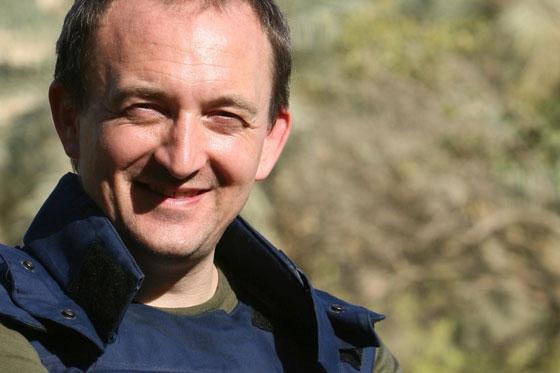
A British journalist kidnapped by Somalian gunmen has been released after 40 days in captivity, the Foreign Office said today.
Colin Freeman, 39, the Sunday Telegraph’s chief foreign correspondent, was snatched by bodyguards escorting him to Boosaaso airport in Somalia.
Freeman had just finished investigating a spate of piracy attacks on shipping in the Gulf of Aden for the paper when the kidnap happened.
Spanish freelance photographer Jose Cendon, also working for the Sunday Telegraph, was taken in the same kidnapping and remained with him throughout.
Freeman told the Telegraph today that he was “absolutely fine and delighted to be out” and “had absolutely no problems at all either physically or mentally”.
He claimed his captors had treated them both well and that they were hidden in caves in the mountains close to the city of Boosaaso.
Freeman said: “We survived on rice, goat meat and Rothmans. I gave up smoking in 1992 and somehow decided now would be a good time to start up again.”
A Telegraph Media Group spokesman said: “We are grateful to all those who have helped secure the safe release of Colin Freeman and Jose Cendon.
“This is wonderful news and we are delighted that the two journalists will soon be reunited with their families, friends and colleagues.
“On behalf of their families, the Telegraph would like to thank all those involved in assisting in the release, including the authorities in Puntland.”
The Foreign Office said it would be offering consular assistance to Freeman but dismissed claims a ransom had been paid for his safe return.
A spokeswoman said: “The government’s policy on ransom is we don’t pay.”
Freeman is not expected to return to Britain until Tuesday at the earliest, but left Somalia on a flight to Kenya today.
A spokeswoman for the Telegraph said: “He’s going to be back in the next few days, it’s not going to be tomorrow.
“He’s in good health and obviously happy to be free. He’s looking forward to having some time to relax and get his energy back.”
The Telegraph said that it first received contact from Freeman five days after he was kidnapped when he called the newsdesk. The newspaper later set up a crisis management team to support his release.
Foreigners, journalists and humanitarian workers are frequently abducted for ransoms in the chaotic and violent Horn of Africa nation.
Omar Faruk Osman, secretary general of the National Union of Somali Journalists, said: “While we welcome the release of Freeman and Cendon, it is intolerable that journalists are kidnapped for ransom in connection with their legitimate work.
“We reiterate our call for the immediate and unconditional release of three journalists – Amanda Lindhout, Abdifatah Mohammed Elmi and Nigel Brennan – who were abducted in Mogadishu on 23 August.”
For two decades, Somalia has been beset by anarchy, violence and an insurgency which has killed thousands of civilians and sent hundreds of thousands fleeing from mortar shells, machine-gun crossfire and grenades.
The United Nations says Somalia has 300,000 acutely malnourished children, but attacks and kidnappings of aid workers have shut down many humanitarian projects.
The anarchy has also allowed Somali pirates to flourish, attacking 111 ships around the Gulf of Aden in 2008, hijacking 42 of them and earning tens of millions in ransom.
Fifteen ships with more than 260 crew are still in the hands of pirates, according to the International Maritime Bureau.
Telegraph.co.uk: Journalists freed in Somalia
Email pged@pressgazette.co.uk to point out mistakes, provide story tips or send in a letter for publication on our "Letters Page" blog
